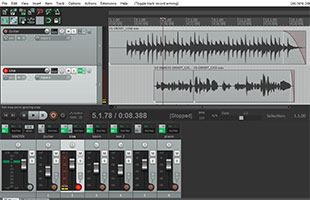How Do You Overdub When The Audio Is Delayed?

My first thought was that he must be trying to record with a really old sound card that probably came with a really old computer. But he went on to say that though he was using a pretty old laptop And he had a Focusrite Scarlett 2i2 audio interface!
What causes latency?
there are several things that can cause latency. But for the most part, it shouldn’t matter if you use an old computer (as long as it has USB ports, which is how many interface units attach) if you connect a decent external audio interface like the 2i2. The 2i2 will give you real-time monitoring, which means you can hear what you are recording in real time. No delay.
But you definitely have to make sure you plug your headphones into the interface box and NOT the computer. In fact, you should make sure that the on-board sound card is disabled. You can do that in your operating system audio preferences or control panel. If you don’t do that, you might end up recording audio both from the intended microphone plugged into your interface, AND potentially from a built-in microphone on the computer somewhere.* This is especially true for laptops, with their helpful (apply sarcasm to that last word) web cams and mics.
Is latency always a problem?
Anyway, latency may not be that huge a problem if you’re just recording a single track of audio like a voiceover. Two seconds is pretty distracting though, even for that.
But that much delay can make multitrack recording pretty much impossible. You need to be able to sing (or play) along with the already-recorded track(s). So if you are overdubbing – layering additional audio tracks to previously recorded audio – you need to address .
Below is my reply to the person who sent me the email:
Hi Joe,
This is almost certainly not the fault of your old computer IF you are using the Focusrite 2i2. But you have to make sure you’re using ASIO as the driver type. You can check this in Reaper under Options/Preferences then select Audio/Device. In the drop down menu in that screen, next to where it says “Audio Device:” you must select “ASIO.” Then you should see your Focusrite Scarlett 2i2 as the input and playback (output) options.
Then I would double-check in your Windows settings (Control Panel then navigate to Audio Devices) to make sure your default input/recording device and playback device is the Focusrite.
One last thing – make sure your headphones are plugged into the Focusrite. If you’re trying to monitor playback through the laptop headphone jack, that could cause this problem.
If you make those changes, you should not have the latency (the term for the playback sounding delayed like you describe), we can check something else. Good luck!
So if you have any issues with latency
Ken
* This actually happened to a guy I was helping to do voiceover recording. He had a good mic (Rode NT1) and interface (Avid FasC:\Users\Studio\Pictures\Reaper_Overdub_Pic.pngt Track Solo), and yet his audio sounded noisy and really echo-y, like he’d recorded it in the kitchen from really far away, into a terrible mic. We tried several solutions to no avail. Finally, I asked him to check in the Windows 7 “Manage Audio Devices” section to see what microphones were enabled.

So if I’m understanding correctly (I think I did this last night….just got the 2i2) I’ve set my focusrite to direct monitor, and I have the interface as focusrite 2i2 for both input and out put. I plug my headphones directly into the 2i2. I should then be able to hear the drum loops or whatever prerecorded tracks while I’m overdubbing my guitar?
I have to wait on the additional condenser mic so currently I use the blue snowball and seperate tracks after the fact. For right now I want to concentrate on making the arrangments (guitar, drum, base, keyboard) then I go to the next step of the mixing and editing. Personally I hate click tracks…they actually throw me off. So when I’m setting up the arrangement of a song, I will often just throw in a simple kick/snare drum loop to keep time, then replace later with more sophisticated drum patterns. I have several good samplers, as well as my midi controller, so building great drum tracks after the fact is not an issue. But keeping the timing and sequencing (grid) straight for adding inserts later is important.
One last question. When listening through the headphones, plugged into the focusrite, should I just completely turn off the monitor speakers? Or just turn them down to zero? thanks.
Martin,
Yes to that part.
As for the monitor speakers – yeah. If I’m using monitoring headphones, it’s usually because I’m overdubbing to a previously recorded track. In that case, you can’t have monitor speakers on if you’re recording in the same room with a mic (vocals, acoustic instruments, etc.). If you’re not using a mic, then you don’t really even need headphones. I usually do that when recording MIDI or amp models. I hope that makes sense.
Cheers,
Ken